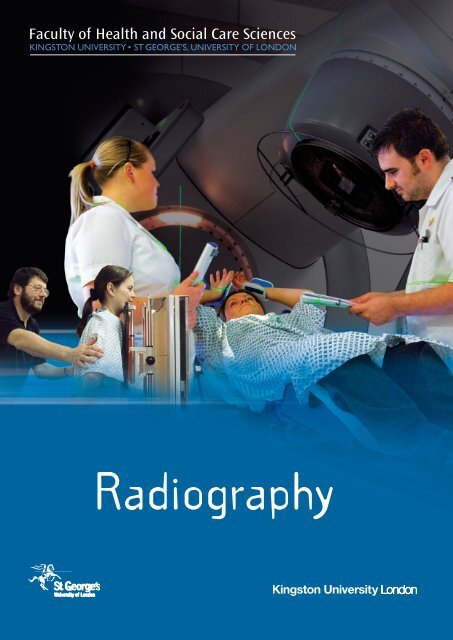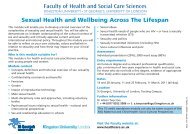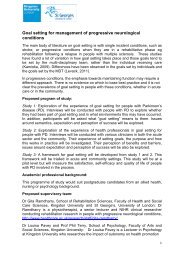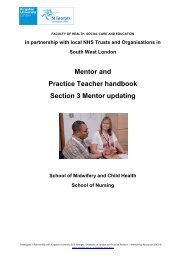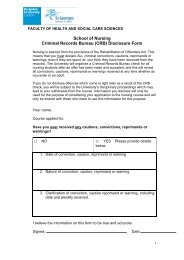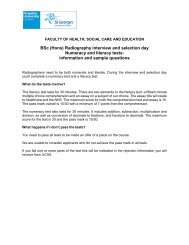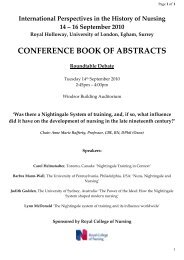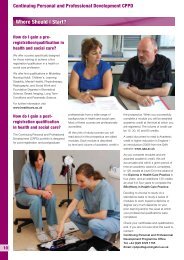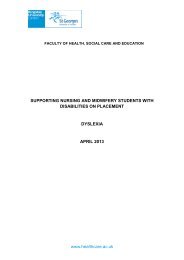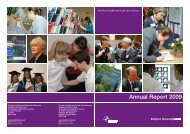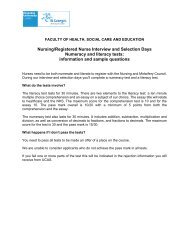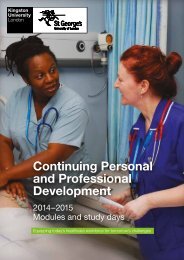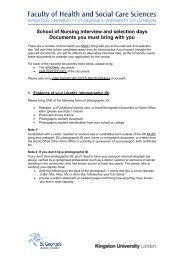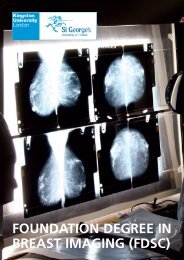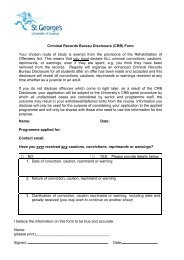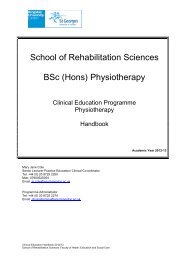Radiography - Faculty of Health, Social Care and Education ...
Radiography - Faculty of Health, Social Care and Education ...
Radiography - Faculty of Health, Social Care and Education ...
Create successful ePaper yourself
Turn your PDF publications into a flip-book with our unique Google optimized e-Paper software.
<strong>Radiography</strong>
Diagnostic <strong>Radiography</strong> (n)<br />
the use <strong>of</strong> a range <strong>of</strong> imaging techniques <strong>and</strong> sophisticated equipment<br />
to produce high quality images <strong>of</strong> an injury or disease.<br />
Therapeutic <strong>Radiography</strong> (n)<br />
the preparation <strong>and</strong> treatment <strong>of</strong> patients<br />
with cancer using radiotherapy.<br />
Contents<br />
0 - 1 <strong>Radiography</strong> at the <strong>Faculty</strong> <strong>of</strong> <strong>Health</strong> <strong>and</strong> <strong>Social</strong> <strong>Care</strong> Sciences<br />
2 - 3 A Dynamic <strong>Care</strong>er<br />
4 - 7 Diagnostic <strong>Radiography</strong><br />
8 - 13 Therapeutic <strong>Radiography</strong><br />
14 - 16 Postgraduate Studies<br />
17 Out <strong>and</strong> About<br />
18 - 19 Fact File<br />
20 - 21 How to Apply?
<strong>Radiography</strong><br />
at the <strong>Faculty</strong> <strong>of</strong><br />
<strong>Health</strong> <strong>and</strong> <strong>Social</strong><br />
<strong>Care</strong> Sciences<br />
One title – two careers<br />
This dem<strong>and</strong>ing, technical <strong>and</strong> scientific discipline requires<br />
exceptional personal qualities <strong>and</strong> in return <strong>of</strong>fers a flexible,<br />
pr<strong>of</strong>essional career with a very high level <strong>of</strong> job satisfaction.<br />
Whilst radiographers work in multi-pr<strong>of</strong>essional teams<br />
alongside other healthcare pr<strong>of</strong>essionals, they also work<br />
autonomously, undertaking independent interventions <strong>and</strong><br />
developing specialist expertise. Considerable maturity <strong>and</strong><br />
independence <strong>of</strong> mind is required to succeed in these<br />
dem<strong>and</strong>ing <strong>and</strong> fast-moving pr<strong>of</strong>essions.<br />
Diagnostic radiographers are responsible for the acquisition<br />
<strong>of</strong> high-quality clinical images used to detect, monitor <strong>and</strong><br />
manage disease processes <strong>and</strong> the effects <strong>of</strong> trauma. As a<br />
diagnostic radiographer you will utilise a wide range <strong>of</strong><br />
sophisticated technological equipment for different imaging<br />
modalities, such as X-ray, Ultrasound, <strong>and</strong> CT <strong>and</strong> MRI<br />
scanners, combined with a high st<strong>and</strong>ard <strong>of</strong> patient care.<br />
Therapeutic radiographers are responsible for the safe <strong>and</strong><br />
accurate planning <strong>and</strong> delivery <strong>of</strong> radiotherapy to patients<br />
with cancer; a vital role that requires the use <strong>of</strong> sophisticated<br />
technology. A course <strong>of</strong> radiotherapy treatment may last from<br />
between one day to seven weeks, <strong>and</strong> you will support the<br />
physical <strong>and</strong> emotional wellbeing <strong>of</strong> the patient throughout.<br />
This degree programme is therefore ideal if you want to<br />
combine a science background with medical <strong>and</strong> biological<br />
sciences, <strong>and</strong> apply your training in a supportive clinical<br />
environment.<br />
Applicants should have:<br />
l<br />
l<br />
l<br />
l<br />
l<br />
l<br />
A commitment to a career in radiography.<br />
A good knowledge <strong>of</strong> pr<strong>of</strong>essional practice, especially in<br />
the NHS.<br />
Evidence <strong>of</strong> academic potential, preferably with a science<br />
background, <strong>and</strong> a commitment to learning.<br />
Effective interpersonal <strong>and</strong> communication skills.<br />
Patience, tact <strong>and</strong> a real interest in <strong>and</strong> commitment to<br />
dealing with people across a wide spectrum <strong>of</strong> ages <strong>and</strong><br />
backgrounds.<br />
A willingness <strong>and</strong> ability to develop problem solving skills.<br />
Working environments<br />
Radiographers can follow several career paths, for example:<br />
Diagnostic Radiographer<br />
General radiography, trauma/accident <strong>and</strong> emergency, CT<br />
scanning, magnetic resonance imaging, nuclear medicine<br />
imaging*, breast screening/mammography*, medical<br />
ultrasound*, teaching*, research*, management*, quality<br />
assurance*. *after additional postgraduate study<br />
Therapeutic Radiographer<br />
Treatment planning, treatment delivery, management,<br />
research, treatment review, treatment <strong>and</strong> patient support,<br />
palliative care, teaching, quality assurance, mould room.<br />
Areas <strong>of</strong> advanced practice<br />
Diagnostic Radiographer<br />
Reporting, interventional radiography, consultant practitioner.<br />
Therapeutic Radiographer<br />
Complex treatment planning, drug prescribing, consultant<br />
practitioner.<br />
1
A dynamic<br />
career<br />
<strong>Radiography</strong> <strong>of</strong>fers graduates excellent employment<br />
prospects within the health service <strong>and</strong> we are confident that<br />
graduates from the School are well prepared for their<br />
pr<strong>of</strong>essional careers as either diagnostic radiographers or<br />
therapeutic radiographers.<br />
Diagnostic radiographers can specialise in advanced areas <strong>of</strong><br />
practice <strong>and</strong> undertake management, teaching or research.<br />
Therapeutic radiographers can develop <strong>and</strong> progress in their<br />
careers towards business or technical management, or<br />
clinical specialism.<br />
There are a number <strong>of</strong> postgraduate programmes available to<br />
diagnostic <strong>and</strong> therapeutic radiographers who wish to<br />
progress either generally or in specialised clinical areas.<br />
We do hope you will consider studying <strong>Radiography</strong> at<br />
Kingston University <strong>and</strong> St George's, University <strong>of</strong> London.<br />
We will expect you to be hard working <strong>and</strong> committed <strong>and</strong> in<br />
return you will receive a first rate pr<strong>of</strong>essional education <strong>and</strong><br />
the dedicated support <strong>of</strong> staff <strong>and</strong> fellow students.<br />
Benefit from the resources <strong>of</strong> two leading Universities<br />
During the course you will spend time at both Kingston<br />
University <strong>and</strong> St George's, University <strong>of</strong> London. Both<br />
institutions have excellent facilities for teaching <strong>and</strong> learning<br />
in radiography, <strong>and</strong> there is a strong emphasis on clinical<br />
education <strong>and</strong> teaching links with clinical radiographers.<br />
Learning will also take place in a wide range <strong>of</strong> hospital<br />
departments, <strong>and</strong> there is regular shared learning with<br />
students from across the healthcare sciences, including<br />
medicine, biomedical sciences, physiotherapy, midwifery <strong>and</strong><br />
nursing.<br />
A supportive learning partnership<br />
Staff <strong>and</strong> students form a lively <strong>and</strong> close-knit team with an<br />
emphasis on working together in partnership to achieve<br />
learning goals. The enthusiastic <strong>and</strong> supportive staff team<br />
maintains current clinical practice links <strong>and</strong> research interests<br />
<strong>and</strong> is complemented by a diverse group <strong>of</strong> motivated <strong>and</strong><br />
committed students.<br />
2
Why study at St George’s,<br />
University <strong>of</strong> London <strong>and</strong><br />
Kingston University<br />
Friendly <strong>and</strong> student focused<br />
We take a personal interest in each individual, providing a<br />
range <strong>of</strong> academic <strong>and</strong> pastoral support to help everyone<br />
achieve their potential.<br />
Cutting edge learning environment<br />
Benefit from dedicated facilities with the latest equipment<br />
(digital X-ray suite, VERT - the Virtual Environment for<br />
Radiotherapy Training, treatment planning s<strong>of</strong>tware), learning<br />
resources, skills laboratory <strong>and</strong> access to an extensive<br />
network <strong>of</strong> libraries <strong>and</strong> databases.<br />
Quality education<br />
Our undergraduate courses in both therapeutic <strong>and</strong><br />
diagnostic radiography have achieved high ratings in<br />
independent Quality Assurance Assessments.<br />
Innovative teaching<br />
We use a variety <strong>of</strong> teaching approaches to help you learn in<br />
a way that suits you best, including case based learning, peer<br />
assisted learning, seminars <strong>and</strong> small group tutorials as<br />
effective <strong>and</strong> interesting methods <strong>of</strong> teaching.<br />
Learning from the experts<br />
Our lecturers are qualified <strong>and</strong> experienced radiographers<br />
with higher degrees <strong>and</strong> teaching qualifications.<br />
Clinical experience<br />
50% <strong>of</strong> the course is clinical, that means that you will work<br />
with patients under the guidance <strong>of</strong> radiographers. This is<br />
your key to becoming competent <strong>and</strong> your chance to benefit<br />
from the close working relationships we have with a wide<br />
range <strong>of</strong> NHS Trusts <strong>and</strong> specialist clinical radiographers.<br />
Sharing knowledge<br />
Some modules are shared with students from other health<br />
<strong>and</strong> social care courses. This gives you an opportunity to<br />
share knowledge <strong>and</strong> insights by studying <strong>and</strong> socialising<br />
together.<br />
Clinical placements<br />
The School <strong>of</strong> <strong>Radiography</strong> has well established links with<br />
local health service providers <strong>and</strong> is able to provide focused<br />
<strong>and</strong> rewarding clinical education placements.<br />
More to choose from<br />
Outside the classroom, students also have a wide choice in<br />
terms <strong>of</strong> social facilities within the two institutions (St<br />
George's, University <strong>of</strong> London <strong>and</strong> Kingston University),<br />
which are especially strong in sport, theatre <strong>and</strong> music.<br />
3
Diagnostic radiographers are responsible for the acquisition<br />
<strong>of</strong> high-quality clinical images used to detect, monitor <strong>and</strong><br />
manage disease processes <strong>and</strong> the effects <strong>of</strong> trauma. As a<br />
diagnostic radiographer you will utilise a wide range <strong>of</strong><br />
sophisticated technological equipment for different imaging<br />
modalities, such as X-ray, Ultrasound, <strong>and</strong> CT <strong>and</strong> MRI<br />
scanners, combined with a high st<strong>and</strong>ard <strong>of</strong> patient care.<br />
Daniella Claxton<br />
This course will enable you to combine a science background<br />
with medical, biological <strong>and</strong> physiological sciences <strong>and</strong> to<br />
apply your training in a caring clinical environment.<br />
The degree will enable you to progress <strong>and</strong> study at<br />
postgraduate certificate, diploma <strong>and</strong> masters levels in areas<br />
<strong>of</strong> advanced practice <strong>and</strong> in specialist areas including<br />
Ultrasound <strong>and</strong> Radionuclide Imaging. This qualification is<br />
recognised internationally <strong>and</strong> <strong>of</strong>fers a range <strong>of</strong> career<br />
opportunities in hospital <strong>and</strong> other clinical settings, as well as<br />
management, teaching <strong>and</strong> research.<br />
Diagnostic<br />
<strong>Radiography</strong><br />
4
Student pr<strong>of</strong>ile<br />
‘<br />
My name is Daniella Claxton. I am 20 years old <strong>and</strong> I am<br />
currently studying diagnostic radiography in my third year.<br />
I have always had an interest in science, particularly in the<br />
human body. I enjoy working with <strong>and</strong> helping others; for four<br />
years I was a volunteer in my local community, involving<br />
myself in projects centred around the care <strong>of</strong> the disabled <strong>and</strong><br />
disadvantaged adults <strong>and</strong> children. The summer before I<br />
started university, I worked as a healthcare assistant in an<br />
elderly residents home.<br />
I discovered radiography about five years ago whilst reading<br />
the NHS careers webpage. I rang up a local hospital <strong>and</strong><br />
secured myself a two week work experience placement in the<br />
radiography department <strong>and</strong> I have not looked back since.<br />
<strong>Radiography</strong> <strong>of</strong>fered me everything that I wanted in a job, with<br />
the opportunity to work as an individual <strong>and</strong> as part <strong>of</strong> a team<br />
within the department <strong>and</strong> with other healthcare<br />
pr<strong>of</strong>essionals.<br />
‘<br />
As a radiographer it is your responsibility to produce images<br />
<strong>of</strong> diagnostic value, whilst maintaining a safe working<br />
environment in adhering to radiation protection measures.<br />
You also need to have good communication skills as you need<br />
to gain the trust <strong>of</strong> the patient in a short space <strong>of</strong> time.<br />
Imaging technology itself is constantly changing <strong>and</strong><br />
improving, <strong>and</strong> I feel privileged to be at the forefront <strong>of</strong> this<br />
ever exp<strong>and</strong>ing medical field.<br />
<strong>Radiography</strong> is an attractive career choice in that it <strong>of</strong>fers<br />
opportunities to specialise <strong>and</strong> study for postgraduate<br />
qualifications. Kingston <strong>and</strong> St George’s University was the<br />
ideal choice. I could commute from home <strong>and</strong> take advantage<br />
<strong>of</strong> being placed in London hospitals. There are plenty <strong>of</strong><br />
resources available across both university sites, which are<br />
excellent for both private <strong>and</strong> group study.<br />
I have had no second thoughts about choosing radiography,<br />
<strong>and</strong> I am looking forward to qualifying next year.<br />
5
Daniella’s<br />
Placement Diary<br />
The alarm clock shrills the beginning <strong>of</strong> another day. This<br />
week I am working my 8am-8pm shifts in the A&E<br />
department, which I know is going to be both mentally <strong>and</strong><br />
physically dem<strong>and</strong>ing. My clinical tutor recommends doing<br />
the 12 hour shift, as things tend to ‘liven-up’ after 5pm…<br />
grabbing my bag, I leave for work.<br />
After a quick breakfast, I head downstairs to A&E X-ray. The<br />
radiographer is already there, taking over from the night<br />
shift. No examination requests have been sent through, <strong>and</strong><br />
the printer sits quietly in the corner. However, the quiet does<br />
not last long <strong>and</strong> the printer springs into life <strong>and</strong> spits out the<br />
first request <strong>of</strong> the day. After reading the clinical indications<br />
<strong>and</strong> patient information, I have to decide how best to<br />
approach the situation <strong>and</strong> which radiographic views would<br />
be best to demonstrate the area <strong>of</strong> interest. Once sure <strong>of</strong> my<br />
intentions, I head <strong>of</strong>f into the department in search <strong>of</strong> my<br />
patient. The patient can be in one <strong>of</strong> five different areas, the<br />
main waiting room, paediatrics, minors, majors or resus.<br />
After finding their name scribbled next to a cubicle number<br />
on the whiteboard, I head to minors. I poke my head around<br />
the curtain <strong>and</strong> introduce myself. After checking I have the<br />
right patient, I push the bed out <strong>of</strong> the cubicle <strong>and</strong> towards<br />
the X-ray room. However, pushing beds is not a walk in the<br />
park. I always seem to get the trolley that has a mind <strong>of</strong> its<br />
own, <strong>and</strong> very quickly the A&E department turns into an<br />
obstacle course. A chest <strong>and</strong> abdomen X-ray later, it’s time to<br />
take the patient back…I return valiant, only to find more<br />
requests waiting <strong>and</strong> the printer whirring away in the<br />
background. The radiographers <strong>and</strong> I work away, <strong>and</strong> X-ray a<br />
variety <strong>of</strong> requests ranging from rugby injuries, falls <strong>and</strong> DIY<br />
injuries, to being knocked out by a horse…the morning<br />
passes quickly <strong>and</strong> soon it is time for lunch.<br />
I return at 1pm <strong>and</strong> my next patient is a child for an abdomen<br />
X-ray. Children are underst<strong>and</strong>ably nervous, no matter how<br />
many rhinos, elephants <strong>and</strong> monkeys have been painted on<br />
the X-ray room walls. It is now that you never underestimate<br />
the power <strong>of</strong> persuasion, or stickers, or sweets from mum for<br />
that matter. We get on to the subject <strong>of</strong> Star Wars, as R2-D2 is<br />
emblazoned on his t-shirt. After much discussion, in which I<br />
am reminded that ‘no’ he hasn’t seen the ‘old’ versions…one<br />
abdomen X-ray has been obtained. The afternoon flies by<br />
<strong>and</strong> the next time I venture into the main waiting room it is<br />
dark outside. 8pm is welcomed by the sound <strong>of</strong> the night<br />
shift arriving, signalling it’s time for me to leave.<br />
Even though the day was tiring, the experience gained with<br />
every patient makes you a more confident <strong>and</strong> competent<br />
student. Being placed in A&E, you never really know what to<br />
expect, <strong>and</strong> how mobile <strong>and</strong> willing your patient may be. I<br />
found the day rewarding, which is a good thing, considering I<br />
have got to do it all again tomorrow…<br />
6
Assessment<br />
A wide range <strong>of</strong> assessment tools are used including:<br />
l<br />
l<br />
l<br />
l<br />
l<br />
l<br />
l<br />
Essays <strong>and</strong> reports<br />
Written examinations<br />
Multiple choice questions<br />
Presentations<br />
Practical examinations<br />
Research reports<br />
Clinical portfolio <strong>and</strong> clinical assessments<br />
A typical week at university for diagnostic radiography<br />
Monday<br />
Tuesday<br />
Wednesday<br />
Thursday<br />
Friday<br />
Visceral Imaging<br />
Science & Technology<br />
Student Centred Study<br />
Skeletal Imaging<br />
Visceral Imaging<br />
Lunch<br />
Lunch<br />
Lunch<br />
Lunch<br />
Lunch<br />
Science & Technology<br />
Pr<strong>of</strong>essional & Personal<br />
Development<br />
Sports <strong>and</strong> Recreation<br />
Pr<strong>of</strong>essional & Personal<br />
Development<br />
Skeletal Imaging<br />
Locations<br />
As a diagnostic radiography student you will spend time at<br />
Kingston University <strong>and</strong> St George’s, University <strong>of</strong> London,<br />
both <strong>of</strong> which have excellent facilities for teaching <strong>and</strong><br />
learning in radiography <strong>and</strong> other healthcare sciences. Fifty<br />
per cent <strong>of</strong> your studies will be undertaken in hospitals.<br />
Clinical placements<br />
Clinical placements are an essential part <strong>of</strong> the radiography<br />
programme. They provide an opportunity to put theory into<br />
practice <strong>and</strong> to consolidate learning experiences. Students<br />
are well supported by their tutors whilst on placements <strong>and</strong><br />
given plenty <strong>of</strong> guidance as to how to gain the greatest<br />
benefit from their experiences. Diagnostic radiographers<br />
work predominantly in hospital diagnostic imaging<br />
departments but also undertake imaging procedures within:<br />
l Operating theatres<br />
l Accident <strong>and</strong> emergency departments<br />
l Resuscitation rooms<br />
l Cardiac catheter laboratories<br />
l Endoscopy suites<br />
l Minor trauma units<br />
l CT (Computed Tomography)<br />
l MRI (Magnetic Resonance Imaging)<br />
l RNI (Radionuclide Imaging)<br />
Frequently used clinical placement sites<br />
l Ashford & St Peters NHS Trust, Chertsey, Surrey<br />
l Chelsea & Westminster NHS Trust, London<br />
l Epsom & St Helier NHS Trust, Carshalton, Surrey<br />
l Frimley Park NHS Trust, Camberley, Surrey<br />
l Great Ormond Street Hospital for Sick Children, London*<br />
l Guy’s & St Thomas’ NHS Trust, London<br />
l Kingston Hospital NHS Trust, Kingston, Surrey<br />
l Mayday University Hospital, Croydon, Surrey<br />
l National Hospital for Neurology <strong>and</strong> Neurosurgery, London*<br />
l St George’s Hospital, London<br />
l The Royal Brompton & Harefield NHS Trust, London*<br />
l The Royal Surrey County Hospital, Guildford, Surrey<br />
l The West Middlesex NHS Trust, London<br />
l Newham University Hospital NHS Trust<br />
*Short, specialist placements only.<br />
Occasionally placements may be at hospital sites further afield.<br />
7
Therapeutic <strong>Radiography</strong> involves the use <strong>of</strong> precisely<br />
targeted, high energy X-rays to treat a range <strong>of</strong> cancers.<br />
Cancer is not just one disease, cancers can develop almost<br />
anywhere within the body <strong>and</strong> there are many different<br />
tumour types; this means that every case is different.<br />
Therapeutic <strong>Radiography</strong> is therefore a very challenging<br />
career. It requires the use <strong>of</strong> a diverse range <strong>of</strong> equipment<br />
<strong>and</strong> techniques to prepare <strong>and</strong> deliver the individualised<br />
treatment that every patient needs.<br />
Martin Brewer<br />
Constant advances in technology allow therapeutic<br />
radiographers to continue to improve the outcomes for patients<br />
with cancer, making this a very rewarding career choice.<br />
Therapeutic<br />
<strong>Radiography</strong><br />
What do therapeutic radiographers do?<br />
The role <strong>of</strong> the therapeutic radiographer is varied <strong>and</strong><br />
dem<strong>and</strong>ing. They prepare patients for radiotherapy by<br />
imaging to locate the tumour (usually with CT); they then<br />
perform a range <strong>of</strong> dose calculations.<br />
When delivering the radiotherapy treatment, therapeutic<br />
radiographers target the tumour with millimetre accuracy<br />
using highly complex equipment <strong>and</strong> techniques to give the<br />
maximum dose to the tumour <strong>and</strong> the minimum possible<br />
dose to the surrounding normal anatomy.<br />
Therapeutic radiographers work with patients <strong>of</strong> all ages<br />
from all social <strong>and</strong> ethnic backgrounds during a potentially<br />
stressful time. Excellent communication skills are therefore<br />
essential.<br />
Effective teamwork is central to the practice <strong>of</strong> therapeutic<br />
radiographers; they work closely in small teams to prepare<br />
<strong>and</strong> deliver the treatment to ensure the highest possible<br />
st<strong>and</strong>ards. Therapeutic radiographers also work closely with<br />
other healthcare pr<strong>of</strong>essionals, eg medical physicists,<br />
oncologists, dieticians, nurses <strong>and</strong> social workers, in order to<br />
care for the patient’s physical <strong>and</strong> emotional needs during<br />
their course <strong>of</strong> treatment.<br />
Key skills <strong>of</strong> the therapeutic radiographer<br />
l Sound underst<strong>and</strong>ing <strong>of</strong> the relevant science <strong>and</strong><br />
technology<br />
l Numeracy<br />
l Attention to detail<br />
l Adaptability – need to be able to meet the fast pace <strong>of</strong><br />
change <strong>and</strong> to meet the needs <strong>of</strong> individual patients<br />
l An ability to work well within a team<br />
l Excellent communication skills<br />
8
Student Pr<strong>of</strong>ile<br />
My name is Martin Brewer, <strong>and</strong> I’m 26. I live in a flat share in<br />
the centre <strong>of</strong> Kingston with my partner, our cats, <strong>and</strong> our<br />
Australian housemate.<br />
I grew up in Bedfordshire <strong>and</strong> Milton Keynes. My childhood<br />
was pretty uneventful; I did well at school <strong>and</strong> enjoyed<br />
music, cycling, <strong>and</strong> all the other childhood stuff.<br />
I had always been interested in all things medical <strong>and</strong><br />
decided at an early age that I wanted to be a doctor. I had<br />
done everything needed to get a place, but due to<br />
competition for places my first application wasn’t successful.<br />
I spent the next year working in a nursing home while<br />
contemplating my options. I decided I still wanted to go to<br />
university <strong>and</strong> do something healthcare related, so I chose to<br />
go to the University <strong>of</strong> Leeds to read Medical Sciences.<br />
I thoroughly enjoyed my time at Leeds, but as time passed<br />
<strong>and</strong> the end <strong>of</strong> the course was getting closer, I was at a loss<br />
as to what to do after university. I didn’t want to pursue a<br />
career in healthcare management or medical research, <strong>and</strong><br />
so after graduating I moved to Middlesbrough in the North<br />
East. I had some family there <strong>and</strong> didn’t fancy moving back in<br />
with my parents.<br />
While living in Middlesbrough I started working for the NHS<br />
at the local mental health trust. I worked with a wide range <strong>of</strong><br />
patients, including adolescents, adults in short <strong>and</strong> long term<br />
care, <strong>and</strong> elderly patients with dementia. I also did voluntary<br />
work with a local charity working with people with HIV <strong>and</strong><br />
promoting safer sex across the Tees Valley.<br />
While working in mental health I decided I wanted a<br />
pr<strong>of</strong>essional career within the health service, <strong>and</strong><br />
contemplated a career in mental health nursing, but after<br />
much thought I felt I would be better suited to a career that<br />
also involved some technical skills. I did some research into<br />
the allied health pr<strong>of</strong>essions, <strong>and</strong> decided a career in<br />
radiotherapy would stretch my technical skills while allowing<br />
me to provide advice <strong>and</strong> support to patients going through a<br />
difficult period in their lives.<br />
I’m now in my second year <strong>and</strong> I have just finished my first<br />
clinical placement at the Royal Marsden Hospital in London,<br />
which has been very intense but totally worth it. Over the<br />
past year I have also started RadSoc, a society for all<br />
radiography students at Kingston University, to allow us to<br />
let our hair down once in a while. I have thoroughly enjoyed<br />
my time so far at Kingston University <strong>and</strong> St George’s,<br />
University <strong>of</strong> London, <strong>and</strong> in terms <strong>of</strong> career path I have<br />
never looked back – I just wish I had chosen therapeutic<br />
radiography as a career when I left school!<br />
I am looking forward to becoming a student ambassador <strong>and</strong><br />
representing both my course <strong>and</strong> the faculty as a whole.<br />
9
Assessment<br />
A wide range <strong>of</strong> assessment tools are used including:<br />
l<br />
l<br />
l<br />
l<br />
l<br />
l<br />
l<br />
Essays <strong>and</strong> reports<br />
Written examinations<br />
Multiple choice questions<br />
Presentations<br />
Practical examinations<br />
Research dissertation<br />
Clinical portfolio <strong>and</strong> clinical assessments<br />
Martin's Clinical Placement Diary<br />
Tuesday 15th August<br />
My day started half an hour earlier than usual, as I was going<br />
to observe quality assurance checks on the treatment<br />
machines, which are done daily to ensure the machines are<br />
working accurately. I was shown how to check the movements<br />
<strong>of</strong> the machine <strong>and</strong> the couch, <strong>and</strong> then how the energies <strong>of</strong><br />
the X-rays <strong>and</strong> the electron beams were checked, followed by<br />
the safety checks.<br />
The patients began to arrive <strong>and</strong> I had to prepare the couch for<br />
the first patient who was having radiotherapy to the breast.<br />
The radiographers then stood back while I positioned the<br />
patient on the couch <strong>and</strong> aligned their tattoos to the room<br />
lasers, <strong>and</strong> then moved the equipment so that the X-ray beam<br />
would treat the breast. The radiographers pushed me a lot<br />
throughout the day to get me used to setting up patients<br />
having radiotherapy to the breast, head <strong>and</strong> neck, prostate,<br />
<strong>and</strong> vertebrae.<br />
During the afternoon I had the opportunity to sit in on a ‘first<br />
day chat’. The patient was told what was going to happen<br />
during treatment <strong>and</strong> then told about the reactions that may<br />
occur due to the radiotherapy. They were given lots <strong>of</strong> advice<br />
on how to minimise these reactions <strong>and</strong> take care <strong>of</strong><br />
themselves during treatment, <strong>and</strong> then the patient was given<br />
the opportunity to ask lots <strong>of</strong> questions. Sitting in on the chat<br />
was invaluable as I saw first h<strong>and</strong> how anxious <strong>and</strong><br />
apprehensive patients were before starting their treatment.<br />
After a very busy day it was time for the cycle home, followed<br />
by a long, hot bath <strong>and</strong> some food!<br />
10
Sophie Main<br />
Student pr<strong>of</strong>ile<br />
‘<br />
Sophie Main, 20, is in her final year <strong>of</strong> BSc (Hons)<br />
Therapeutic <strong>Radiography</strong> <strong>and</strong> currently lives in a student<br />
house with five others.<br />
I’d always wanted to be part <strong>of</strong> the caring pr<strong>of</strong>ession but<br />
couldn’t quite decide what I wanted to do until I read through<br />
Kingston <strong>and</strong> St George’s prospectus <strong>and</strong> found therapeutic<br />
radiography.<br />
I gained nine GCSEs grade C-D <strong>and</strong> got merit/merit/merit in a<br />
BTEC National Diploma in Sports <strong>and</strong> Exercise Science.<br />
The course started in September <strong>and</strong> for the first term was<br />
the common foundation programme. This term was<br />
extremely useful <strong>and</strong> we got to work with people studying<br />
for other health disciplines too, such as physiotherapists,<br />
nurses, medics <strong>and</strong> midwives. After that we started to learn<br />
about the most common cancers.<br />
When we are at uni there is a variety <strong>of</strong> work: some <strong>of</strong> it is<br />
facts <strong>and</strong> figures regarding different cancers, as well as<br />
learning about patient care <strong>and</strong> communication. Some <strong>of</strong> the<br />
‘<br />
work is undertaken in groups <strong>and</strong> some <strong>of</strong> it is guided study.<br />
For guided study you are given a subject <strong>and</strong> time <strong>of</strong>f to go<br />
away <strong>and</strong> learn about it independently.<br />
Clinical placement is great, you get a real feel for what life<br />
will be like once you are qualified, as well as putting the<br />
theory you have learnt into practice. I always understood the<br />
theory a lot more after being on placement because I could<br />
see the way in which everything worked.<br />
I receive a means tested bursary, which helps me to pay my<br />
rent. I am also signed up to a Hospitality Agency so I work<br />
when I have free time <strong>and</strong> if I don’t I am not tied into a<br />
contract so I can focus on my studies. Alongside this I am<br />
also a student ambassador, this has given me some great<br />
experience <strong>and</strong> helped earn some extra pennies.<br />
I have thoroughly enjoyed the course (even the stressful<br />
times ended up being positive ones – <strong>and</strong> that’s the truth).<br />
I’ve not only developed a career I love, but in the process<br />
had the best time <strong>of</strong> my life <strong>and</strong> met some fantastic people.<br />
11
Sophie’s University Diary<br />
A usual day at university in the third year is 9.30am – 3pm,<br />
three times a week.<br />
This morning’s lecture was learning more about the cancer<br />
care path. During this we explored the reasons behind the<br />
ways in which patients act when dealing with their emotions.<br />
The learning styles used in the third year are geared towards<br />
discussions about experiences we have had <strong>and</strong> how we have<br />
dealt with them. The lecturer also adds some other topics into<br />
the discussion that we may not have considered; this is great<br />
as it makes us think ‘outside the box’ which in turn makes us<br />
well-rounded radiographers. At the end <strong>of</strong> each lecture we are<br />
given some guided study for the following week’s lecture.<br />
Guided study is set in order to make us go away <strong>and</strong> explore<br />
the subject in our own way, so that we gain a better<br />
underst<strong>and</strong>ing. Doing guided study before the lecture also<br />
gives us a chance to ask questions <strong>and</strong> clarify areas that we<br />
are unsure <strong>of</strong>.<br />
Lunch is about an hour long. During this time, me <strong>and</strong> a<br />
couple <strong>of</strong> friends grab a bite to eat <strong>and</strong> head to the library to<br />
find some books for the guided study. Books found, now time<br />
for a girlie gossip.<br />
The afternoon lecture was on radiotherapy errors. This lecture<br />
was also given in the form <strong>of</strong> an open discussion: the lecturer<br />
would say what an error was <strong>and</strong> then ask us to give examples<br />
<strong>of</strong> what these might be. I believe it is important to be open<br />
about errors that occur because it is how others learn <strong>and</strong> the<br />
way errors get rectified. We are in groups for this topic <strong>and</strong> in<br />
several weeks’ time will be asked to give a small presentation<br />
to the class on particular subjects set by the lecturer. This topic<br />
has made me become more aware <strong>of</strong> the types <strong>of</strong> errors that<br />
can occur within radiotherapy <strong>and</strong> made me think more about<br />
what I am doing when on clinical placement so that I can<br />
reduce the likelihood <strong>of</strong> an error occurring.<br />
We also have lectures on other subjects such as interpr<strong>of</strong>essional<br />
management. This subject was designed to get<br />
different disciplines to underst<strong>and</strong> each other’s role in the<br />
patient’s care.<br />
12
Virtual Environment for<br />
Radiotherapy Training (VERT)<br />
Therapeutic radiography students will have a chance to<br />
practice their radiography skills in a safe <strong>and</strong> supportive<br />
environment using the latest Virtual Reality known as VERT.<br />
VERT creates a 3-dimensional treatment suite comprising the<br />
linear accelerator, the room in which it is situated, <strong>and</strong> the<br />
patient lying on the couch. Using state <strong>of</strong> the art tracking<br />
technology it also provides an interactive function for<br />
students to acquire <strong>and</strong> practise a range <strong>of</strong> psychomotor<br />
skills necessary for the accurate delivery <strong>of</strong> radiotherapy.<br />
This innovative equipment allows us to further enhance our<br />
teaching <strong>and</strong> the learning experience <strong>of</strong> students.<br />
A typical week at university for therapeutic radiography<br />
Monday<br />
Tuesday<br />
Wednesday<br />
Thursday<br />
Friday<br />
Radiotherapy <strong>and</strong><br />
Oncology Lecture<br />
Science <strong>and</strong> Technology<br />
Demonstration<br />
Study <strong>and</strong> Recreation<br />
Radiotherapy <strong>and</strong><br />
Oncology<br />
Radiotherapy <strong>and</strong><br />
Oncology Practical<br />
Workshop<br />
Lunch<br />
Lunch<br />
Lunch<br />
Lunch<br />
Lunch<br />
Science & Technology<br />
Lecture<br />
Communication Key<br />
Speaker<br />
Study <strong>and</strong> Recreation<br />
Communication <strong>and</strong><br />
Group Work<br />
Radiotherapy <strong>and</strong><br />
Oncology Lecture<br />
Clinical placements<br />
Clinical Placements are an essential part <strong>of</strong> the <strong>Radiography</strong><br />
programme. They provide an opportunity to put theory into<br />
practice <strong>and</strong> to consolidate learning experiences. Students<br />
are well supported by their tutors whilst on placements <strong>and</strong><br />
given plenty <strong>of</strong> guidance as to how to gain the greatest<br />
benefit from their experiences. Therapeutic radiographers<br />
predominantly work in departments <strong>of</strong> radiotherapy treating<br />
patients. Their role involves:<br />
l Calculation <strong>of</strong> dose<br />
l Delivery <strong>of</strong> radiotherapy<br />
l Verification<br />
l Information giving <strong>and</strong> support<br />
Frequently used clinical placement sites<br />
l The Royal Marsden Hospital, Sutton<br />
l The Royal Marsden Hospital, Chelsea<br />
l The Royal Surrey County Hospital, Guildford, Surrey<br />
l Preparation <strong>of</strong> patients for radiotherapy<br />
l Imaging to localise tumour<br />
Occasionally placements may be at hospital sites further afield.<br />
l Definition <strong>of</strong> tumour volumes <strong>and</strong> normal anatomy<br />
13
PgCert/PgDip/MSc in Medical Imaging<br />
for diagnostic radiographers<br />
PgCert/PgDip/MSc in Oncology Practice<br />
for therapeutic radiographers<br />
PgCert/PgDip/MSc in Breast Evaluation<br />
for health pr<strong>of</strong>essionals working in the area <strong>of</strong> breast<br />
imaging, diagnosis <strong>and</strong> care<br />
All three fields – Medical Imaging, Oncology Practice <strong>and</strong><br />
Breast Evaluation – are <strong>of</strong>fered as either a part-time block<br />
release course or as a full-time course.<br />
Modules relate to clinical practice, management, supervision<br />
<strong>and</strong> assessment, quality issues, research methods, etc to<br />
prepare practitioners for advanced practice relevant to their<br />
needs <strong>and</strong> the needs <strong>of</strong> the clinical departments.<br />
Postgraduate Studies<br />
Some <strong>of</strong> the clinical modules are delivered in partnership<br />
with centres <strong>of</strong> excellence eg Jarvis <strong>and</strong> St George’s Breast<br />
Screening Training Centres; Guy’s, King’s <strong>and</strong> St Thomas’<br />
Hospitals, Department <strong>of</strong> Dental Radiology; the Royal<br />
Marsden NHS Trust; <strong>and</strong> the Bristol Haematology <strong>and</strong><br />
Oncology Centre.<br />
14
Discipline specific modules include<br />
Medical Imaging<br />
l Advanced Dental <strong>and</strong> Maxillo-Facial <strong>Radiography</strong><br />
l Computed Tomography I – Principles<br />
l Computed Tomography II – Clinical Practice<br />
l Foundation to Image Interpretation<br />
l Magnetic Resonance Imaging I – Principles<br />
l Principles <strong>of</strong> Digital Imaging<br />
l Principles <strong>and</strong> Practice <strong>of</strong> Administration <strong>of</strong> Intravenous<br />
Injections<br />
Oncology Practice<br />
l Cancer Management<br />
l External Beam Radiotherapy Planning<br />
l Image Guided Radiotherapy Verification<br />
l Management <strong>of</strong> Treatment Toxicity in Oncology<br />
l Radiotherapy Practice<br />
Breast Evaluation<br />
l Advanced Principles <strong>and</strong> Practice <strong>of</strong> Breast Assessment<br />
Techniques<br />
l Breast Cancer Treatment, Management <strong>and</strong> <strong>Care</strong><br />
l Clinical Breast Examination <strong>and</strong> Client Communication<br />
l Family History <strong>and</strong> Genetics <strong>of</strong> Breast Cancer<br />
l Introduction to Breast Imaging with Radiation<br />
l Management <strong>of</strong> People in the Workplace<br />
l Pr<strong>of</strong>essional Practice in Mammography I<br />
l Pr<strong>of</strong>essional Practice in Mammography II<br />
l Ultrasound <strong>of</strong> the Breast<br />
Generic modules<br />
l Assessing <strong>and</strong> Supervising in the Workplace<br />
l Dissertation (equivalent to four modules)<br />
l Managing Continual Pr<strong>of</strong>essional Development<br />
l Pr<strong>of</strong>essional <strong>Care</strong> <strong>of</strong> Paediatric Patients in <strong>Radiography</strong><br />
l Quality <strong>and</strong> Pr<strong>of</strong>essional Issues in <strong>Health</strong> <strong>Care</strong><br />
l Research Methods<br />
l Self-Managed Learning<br />
15
Postgraduate Student Pr<strong>of</strong>ile<br />
Sue Garnett<br />
Postgraduate <strong>Radiography</strong> Student<br />
I have enjoyed my five year association with Kingston<br />
University as a part time postgraduate student. Even though it<br />
has been hard work <strong>and</strong> dem<strong>and</strong>ing on top <strong>of</strong> a full-time job, I<br />
have gained new skills <strong>and</strong> academic achievement <strong>and</strong> it has<br />
been worth all the effort.<br />
I am a radiographer <strong>and</strong> took on a new advanced practice role<br />
in Coventry Breast Unit. I initially achieved a mammography<br />
film-reading postgraduate certificate at Salford University <strong>and</strong><br />
then transferred to Kingston University to do the research<br />
methods along with the digital imaging modules. More clinical<br />
based modules were then studied which were pertinent to my<br />
job <strong>of</strong> assessing <strong>and</strong> diagnosing breast conditions, as part <strong>of</strong><br />
my evolving role as a clinical practitioner. When these were<br />
behind me I attempted the daunting task <strong>of</strong> my dissertation.<br />
My proposal was submitted <strong>and</strong> accepted, the ethics<br />
committee was tackled <strong>and</strong> I began the research. I was given<br />
help <strong>and</strong> encouragement from my supervisors each step <strong>of</strong> the<br />
way. I was much rewarded with passing <strong>and</strong> also winning a<br />
prize on top!<br />
However, all was not finished, my department desperately<br />
needed a consultant radiographer to work independently<br />
alongside the clinical team, as the breast screening<br />
programme is extending its age range <strong>and</strong> more women will<br />
pass through our department. I lacked a breast ultrasound<br />
qualification, so I returned to Kingston last year to take this;<br />
another logbook to complete <strong>and</strong> exams to pass.<br />
All is behind me now <strong>and</strong> the consultancy post is achievable.<br />
Following the Kingston postgraduate programme has been<br />
enormously beneficial to my career. I have obtained<br />
qualifications, skills <strong>and</strong> an academic life experience which I<br />
have enjoyed as well as making new friends <strong>and</strong> contacts.<br />
Teaching is a new direction I would like to explore <strong>and</strong><br />
incorporate into my forthcoming role. Also a PHD? We will see.<br />
Overall the MSc programme <strong>of</strong>fers more than a qualification.<br />
Of course it depends on the time <strong>and</strong> effort put in, but the<br />
rewards have been so worthwhile.<br />
Entry requirements<br />
l<br />
l<br />
l<br />
l<br />
l<br />
Degree/diploma or equivalent in radiography.<br />
At least two years’ full-time clinical experience.<br />
Evidence <strong>of</strong> the academic potential needed to<br />
study at postgraduate level.<br />
You must also have mentoring support from<br />
appropriate personnel at your workplace for those<br />
modules with a clinical element.<br />
International students must have an IELTS score<br />
<strong>of</strong> 6.5 or equivalent.<br />
Fees<br />
For details <strong>of</strong> fees for UK <strong>and</strong> international students<br />
please visit our website at www.healthcare.ac.uk<br />
How to Apply<br />
For an application form please contact:<br />
Postgraduate administrator<br />
T: +44 (0)20 8547 8828<br />
E: postgradrad-info@kingston.ac.uk<br />
School <strong>of</strong> <strong>Radiography</strong><br />
<strong>Faculty</strong> <strong>of</strong> <strong>Health</strong> <strong>and</strong> <strong>Social</strong> <strong>Care</strong> Sciences<br />
Kingston University <strong>and</strong> St George’s, University <strong>of</strong><br />
London<br />
Penrhyn Road<br />
Kingston upon Thames<br />
Surrey<br />
KT1 2EE<br />
16
Out <strong>and</strong> About<br />
St George’s, University <strong>of</strong> London<br />
St George's, University <strong>of</strong> London<br />
St George's is connected to the heart <strong>of</strong> London by<br />
tube <strong>and</strong> bus, providing easy access to all the<br />
attractions <strong>of</strong> the capital city. There are restaurants,<br />
pubs, clubs, shops, theatres, museums, galleries <strong>and</strong><br />
a wide range <strong>of</strong> other sporting, cultural <strong>and</strong> leisure<br />
facilities. As well as the tourist attractions, London<br />
also <strong>of</strong>fers an attractive life style to students on low<br />
incomes, from bustling street markets to parks <strong>and</strong><br />
river walks. Students benefit from discounts on<br />
many items such as travel, theatre tickets, shops <strong>and</strong><br />
cinemas.<br />
Kingston University<br />
Kingston University campus showing Penrhyn Road<br />
Penrhyn Road campus is the hub <strong>of</strong> student activity in<br />
Kingston. Students from all campuses converge on<br />
this large complex, home to the Students' Union<br />
headquarters, the gym <strong>and</strong> the health centre.<br />
Kingston-upon-Thames is a vibrant town with its own<br />
distinctive identity, yet only 20 minutes by train from<br />
Central London. Its setting on the River Thames <strong>and</strong><br />
surrounding areas <strong>of</strong> parkl<strong>and</strong> make Kingston one <strong>of</strong><br />
London’s most attractive areas.<br />
17
Undergraduate<br />
Fact File<br />
Residential accommodation<br />
Residential accommodation is normally available during the first<br />
year <strong>and</strong> support is given in finding accommodation for the<br />
remainder <strong>of</strong> the course. Information is available on the Kingston<br />
University <strong>and</strong> St George's, University <strong>of</strong> London websites.<br />
Student finance<br />
British students resident in the UK are normally eligible for a<br />
Department <strong>of</strong> <strong>Health</strong> means-tested bursary. Tuition fees are<br />
paid for all UK <strong>and</strong> European Union students.<br />
International students may not apply.<br />
Academic Requirements<br />
In addition to the above, c<strong>and</strong>idates must <strong>of</strong>fer at least one <strong>of</strong><br />
the following:<br />
GCE A Level<br />
C<strong>and</strong>idates should normally <strong>of</strong>fer a minimum <strong>of</strong> 260 UCAS<br />
points (equivalent to BCC). Science subjects are preferred. We do<br />
not accept c<strong>and</strong>idates who are taking A Levels over three years<br />
but c<strong>and</strong>idates may re-sit modules throughout years 12 <strong>and</strong> 13.<br />
Actual or predicted grades will be taken into consideration when<br />
assessing applications. General Studies <strong>and</strong> Key Skills will not be<br />
accepted as qualifying subjects.<br />
International Baccalaureate<br />
Assessed on individual basis.<br />
l<br />
l<br />
l<br />
l<br />
GCSE c<strong>and</strong>idates require at least five subjects at GCSE<br />
with grades A*-C including English Language, Maths <strong>and</strong><br />
Physics or Combined Sciences. If English Language GCSE<br />
is not taken, you must pass the International English<br />
Language Testing System (IELTS) with 7.0 overall (with no<br />
section less than 6.5).<br />
All c<strong>and</strong>idates must be classed as Home Students (which<br />
includes nationals <strong>of</strong> EU countries). At present<br />
international students (ie those from outside the EU) are<br />
not accepted to St George’s for Diagnostic <strong>Radiography</strong>.<br />
UCAS personal statement: In addition to meeting the<br />
academic criteria for admission, you must be able to<br />
demonstrate a broad awareness <strong>of</strong> the scope <strong>of</strong><br />
radiography <strong>and</strong> show a keen interest in a career in this<br />
area. This should be evident from your personal statement.<br />
Work experience: All c<strong>and</strong>idates should demonstrate<br />
relevant work experience.<br />
Access Diplomas<br />
We will consider applications from c<strong>and</strong>idates taking Access to<br />
Science or Access to <strong>Health</strong> Science Diplomas. You must achieve<br />
the full diploma at distinction level with two thirds <strong>of</strong> the diploma<br />
being science based. If the c<strong>and</strong>idate is in any doubt, they should<br />
arrange for the college to send a course content syllabus for the<br />
Admissions Tutor to approve. The syllabus should be sent<br />
initially to the Admissions Officer for <strong>Radiography</strong>, Lynda Carter<br />
(lcarter@sgul.ac.uk)<br />
BTEC National Diplomas <strong>and</strong> Certificates (eg BND/C)<br />
We will consider c<strong>and</strong>idates with a National Diploma in <strong>Health</strong><br />
Studies or Science. You must pass all modules <strong>and</strong> gain at least<br />
DMM at the final level.<br />
18
Advanced GNVQ<br />
C<strong>and</strong>idates must achieve a minimum Distinction grade for<br />
AGNVQ level. Science subjects are preferred.<br />
Science Foundation Course<br />
C<strong>and</strong>idates require a minimum overall score <strong>of</strong> 60%.<br />
Open University<br />
We will consider 120 OU credits. 60 must be ‘Exploring Science’<br />
<strong>and</strong> 30 each for two other modules, one <strong>of</strong> which must be either<br />
‘Human Biology’ or ‘Biology, Uniformity <strong>and</strong> Diversity’. Please<br />
note: all results must be received <strong>and</strong> verified by us by 1<br />
September <strong>and</strong> therefore c<strong>and</strong>idates studying with the Open<br />
University should bear this in mind.<br />
International qualifications<br />
For those c<strong>and</strong>idates with other EU <strong>and</strong>/or international<br />
qualifications. Applicants should normally present with<br />
qualifications equivalent to those <strong>of</strong> home students <strong>and</strong> must<br />
provide evidence <strong>of</strong> pr<strong>of</strong>iciency in English. Further information<br />
can be obtained by writing to the BSc Admissions Officer<br />
giving details <strong>of</strong> the examinations <strong>and</strong> grades.<br />
Applicant Category<br />
Deferred entry<br />
We welcome applications from c<strong>and</strong>idates who wish to defer<br />
entry to Diagnostic <strong>and</strong> Therapeutic <strong>Radiography</strong> by a year,<br />
provided they plan to use the time constructively. You must<br />
inform us by 1 June <strong>of</strong> the year <strong>of</strong> entry if you wish to defer.<br />
Mature applicants<br />
We will consider applications from mature c<strong>and</strong>idates with<br />
alternative qualifications <strong>and</strong> evidence <strong>of</strong> assessed education<br />
within five years <strong>of</strong> starting the course. Cases will be considered<br />
on individual merit. There is no upper age limit for this course.<br />
Transfers<br />
The School does not accept transfers from radiography courses<br />
at other universities.<br />
19
?<br />
How to<br />
Apply?<br />
An <strong>of</strong>fer <strong>of</strong> place will be conditional on:<br />
Equal opportunities policy<br />
l<br />
l<br />
l<br />
l<br />
A satisfactory occupational health check,<br />
including necessary vaccinations.<br />
Satisfactory enhanced criminal record bureau<br />
(CRB) clearance.<br />
Compliance with the uniform policies <strong>of</strong> NHS<br />
placement Trusts.<br />
Full disclosure <strong>of</strong> previous educational <strong>and</strong><br />
pr<strong>of</strong>essional experience.<br />
Applications are considered on an equal basis, irrespective <strong>of</strong><br />
gender, sexual orientation, marital or parental status, social<br />
class, nationality, religion, or ethnic origin. The School is<br />
carefully monitoring the selection process on a regular basis in<br />
order to ensure that no discrimination takes place.<br />
Selection procedure <strong>and</strong> policy<br />
Applicants will be selected on the basis <strong>of</strong> academic <strong>and</strong><br />
personal criteria <strong>and</strong> those who meet the relevant criteria will<br />
be invited to attend an interview. Applicants are encouraged to<br />
undertake or to have undertaken, a short period <strong>of</strong> work<br />
experience in an appropriate setting.<br />
The admissions policy is intended to open the course to<br />
c<strong>and</strong>idates who satisfy the entry requirements having followed<br />
the widest possible range <strong>of</strong> academic routes. However, the<br />
vocational nature <strong>of</strong> the course means that there will be<br />
requirements that it may not be possible for some applicants<br />
with a disability to meet. Applicants are strongly advised to<br />
contact the Admissions Tutor as early as possible before<br />
applying. A copy <strong>of</strong> the School's Disability Statement is<br />
available from the BSc Admissions Officer.<br />
20
Applications should be made through the Universities <strong>and</strong><br />
Colleges Admissions Service (UCAS). Application forms are<br />
available by writing to:<br />
Universities <strong>and</strong> Colleges Admissions Service (UCAS)<br />
Rosehill<br />
New Barn Lane<br />
Cheltenham<br />
Gloucester GL52 3LZ<br />
You should send your application to UCAS between September<br />
<strong>and</strong> mid-January for entry in the following September. It is<br />
advisable to make your application as early as possible.<br />
www.ucas.ac.uk<br />
E-mail: enq@ucas.ac.uk<br />
Application Packs for UCAS: 0870 1122200<br />
UCAS Enquiries: 0870 1122211<br />
Application code<br />
Diagnostic <strong>Radiography</strong><br />
3 year full time course<br />
UCAS Code: B821<br />
Therapeutic <strong>Radiography</strong><br />
3 year full time course<br />
UCAS Code: B822<br />
Further information<br />
More information regarding Kingston University <strong>and</strong> St<br />
George's, University <strong>of</strong> London is available in other<br />
prospectuses <strong>and</strong> supporting booklets.<br />
Admissions Tutor<br />
Tel: 020 8417 2399<br />
Email: radiography@sgul.kingston.ac.uk<br />
Recruitment Team<br />
Ms Lynda Carter<br />
BSc Admissions Officer<br />
St George's, University <strong>of</strong> London<br />
Cranmer Terrace<br />
London SW17 ORE<br />
Tel: 020 8725 0499<br />
Fax: 020 8725 2734<br />
E-mail: lcarter@sgul.ac.uk<br />
www.healthcare.ac.uk<br />
www.sgul.ac.uk<br />
www.kingston.ac.uk<br />
Open Days at St George's are held on the last Wednesday <strong>of</strong><br />
the month. Please contact BSc Admissions Officer on 020 8725<br />
0499 for details.<br />
The <strong>Faculty</strong> also holds regular open days for all its courses.<br />
Please telephone the Recruitment Team on 020 8547 8735 for<br />
dates or visit our web site: www.healthcare.ac.uk<br />
The School <strong>of</strong> <strong>Radiography</strong> would like to thank the Royal Marsden NHS Foundation Trust <strong>and</strong> staff<br />
for hosting <strong>and</strong> participating in the photography for this prospectus.<br />
Design by Wish Design Photography by Helen Stone Produced by Point Clear Public Relations<br />
21


